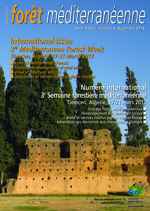
- Année : 2013
- Auteur(s) : CROITORU L., LIAGRE L.
- Référence : T. XXXIV, n°4, 2013, pp. 291-298.
- Mots-clés : MAROC, TUNISIE, ECOLOGIE FORESTIERE, FONCTIONS MULTIPLES DE LA FORET, BASSIN VERSANT, QUERCUS SUBER (Chêne liège), PAIEMENT DES SERVICES ENVIRONNEMENTAUX (PSE)
Article en accès libre et téléchargement gratuit
Résumé
Although there is broad agreement that forests can make substantial contributions to a green economy, their precise role has not yet been investigated comprehensively. This paper addresses this gap for forests in the Middle East and North Africa and makes concrete recommendations to decision-makers. Overall, non-timber forest products are the most important forest benefit. Watershed protection is very significant. Specific ecosystems can reach particularly high values, such as cork oak in Tunisia and Maamora forests in Morocco. A wide range of instruments has been developed to help capture forest benefits in ways that promote a green economy. Some countries have already created value chains for non-wood forest products, established protected areas, and promoted green accounting. However, only a few countries have introduced innovative mechanisms such as payments for environmental services and carbon finance.
Téléchargement de l'article
Spécial Numéro international "Semaine forestière méditerranéenne de Tlemcen" - T. XXXIV, n°4, 2013
S'abonner, adhérer, nous soutenir
Je m'abonne pour recevoir les publications de l'association, j’adhère à l’association
en payant ma cotisation et je soutiens l’association en faisant un don.
